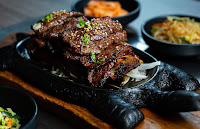Just as architecture shapes the physical world, personal development shapes the essence of who we are and who we become. The Five Orders of Architecture, with their unique characteristics, can be seen as metaphors for different aspects of personal growth and transformation.
Doric Order - Strength and Foundation:
The Doric Order, known for its sturdy design and lack of ornate details, represents the foundation of personal development - strength and resilience. Like the Doric column with no base, our personal growth begins with a solid foundation built on self-awareness, determination, and the ability to endure challenges. Emphasizing strength and masculinity, the Doric Order reminds us to build a strong core within ourselves, ready to face any obstacles that come our way.
Ionic Order - Grace and Elegance:
The Ionic Order, characterized by its graceful scrolls and slender columns, serves as a metaphor for cultivating elegance and poise in our personal development. Just as the Ionic column stands on its distinctive base, our growth relies on a firm footing of self-confidence and emotional intelligence. Embracing grace and elegance, we learn to navigate life's complexities with a sense of finesse and dignity, inspiring others with our composed demeanor.
Corinthian Order - Beauty and Ornamentation:
The Corinthian Order, with its ornate acanthus leaf capitals, symbolizes the pursuit of beauty and refinement in our personal development. Like the Corinthian column, adorned with intricate decoration, our journey includes adding the finishing touches of kindness, empathy, and compassion. By nurturing inner beauty and embracing acts of kindness, we create a life that radiates warmth and love, making the world a more beautiful place for ourselves and others.
Tuscan Order - Simplicity and Stability:
The Tuscan Order, with its straightforward design and simple base, represents the power of simplicity and stability in personal development. Similar to the Tuscan column's robustness, we find strength in simplicity, removing unnecessary clutter from our lives to focus on what truly matters. By maintaining stability and clarity, we create a solid structure of inner peace and contentment that stands firm even amidst life's storms.
Composite Order - Synthesis and Integration:
The Composite Order, blending the grace of the Ionic Order with the ornamentation of the Corinthian Order, serves as a metaphor for synthesizing and integrating diverse aspects of personal development. Just as the Composite column combines elements from different styles, our growth involves embracing our multifaceted selves and integrating our strengths, passions, and values into a harmonious whole. By striving for synthesis and balance, we unlock our fullest potential and create a unified and authentic self.
In conclusion, the Five Orders of Architecture offer valuable metaphors for personal development. Just as architects skillfully design buildings, we have the power to shape our personal growth and become the architects of our lives. Drawing inspiration from the Doric Order's strength, the Ionic Order's elegance, the Corinthian Order's beauty, the Tuscan Order's simplicity, and the Composite Order's synthesis, we can construct a life that embodies resilience, grace, refinement, stability, and authenticity. By aligning our personal development with these metaphors, we embark on a transformative journey towards becoming the best version of ourselves.












